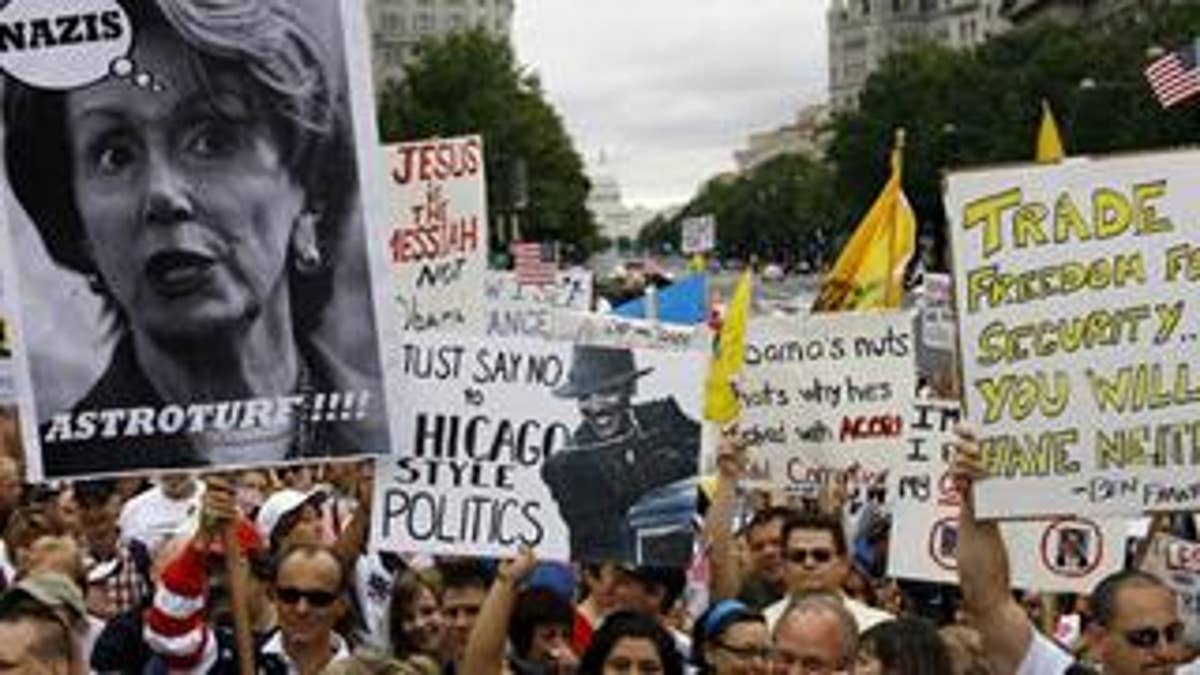
A majority of Americans oppose the Democrats' health care reform plans, polls show. Tens of thousands of demonstrators hit the streets of Washington Saturday to protest the federal government. And summer town hall meetings were marked by the outbursts of noisy constituents confronting their lawmakers over health care reform.
In response, the Obama administration has called this discontent "manufactured," misguided and out-of-touch with the mainstream.
So is the administration banking on its own "Silent Majority?"
Just as President Richard Nixon built a crushing victory in 1972 on the so-called Silent Majority -- those supposedly well-behaved Americans who did not protest their government -- the current administration seems to be pushing the argument that its support is broad-based and quietly minding its own business.
"A quiet plurality," is how Georgetown University professor Stephen Wayne put it, declining to invoke the specific term for the divisive politics of the Nixon administration.
Whether the Obama administration enjoys, or will soon enjoy, such a plurality is unclear. Public opinion continues to shift. But the administration is claiming that support all the same.
"I don't think it's indicative of the nation's mood," senior adviser David Axelrod said Sunday when asked about the weekend demonstrations, suggesting that the "tea party" protesters are not in the mainstream and not in the majority.
"My message to them is, they're wrong," Axelrod said.
The administration is tapping a familiar strategy to claim it has the support of the people, dispensing Spiro Agnew-style put-downs to marginalize the noisy opposition -- though it has yet to land on gems like the former vice president's "nattering nabobs of negativism."
"I will also say that in the era of 24-hour cable news cycles that the loudest, shrillest voices get the most attention," Obama said Sunday on CBS's "60 Minutes," reacting in part to South Carolina Rep. Joe Wilson calling him a liar last week on the floor of Congress.
Speaking on CBS' "Face the Nation," Axelrod called similar demonstrations over the summer an example of the "angriest, most strident voices." He pointed to a recent poll to prove "they don't represent a mainstream view."
That CBS poll, taken after Obama delivered a health care address to a joint session of Congress, showed 52 percent approve of the president's handling of health care, versus 38 percent who disapprove.
But that's just a sliver of public opinion data. The same poll showed more Americans think the new health care plans will hurt them than help.
And a similar CBS poll a week earlier, not taken immediately after a high-profile Obama speech, showed 47 percent disapprove of his handling of the issue, versus 40 percent who approve.
Likewise, a Gallup poll released Sept. 8 showed 39 percent of Americans would direct their member of Congress to vote against health care reform, while 37 percent would direct them to vote for it.
And a Washington Post-ABC News poll on Monday showed 48 percent are opposed to proposed changes, while 46 percent are in favor. That survey, though, may have zeroed in on the sticking point -- and the key to unlocking the kind of majority Obama seeks.
The poll showed that if the proposed government-run insurance plan is taken out of the bill, then 50 percent back the rest of the health care overhaul, while 42 percent still oppose it.
Wayne, echoing the view of several prominent senators, said that in order to build that majority Obama and his Democratic allies are probably going to have to drop the so-called "public option."
Until then, Wayne said the protesters are "large enough not to be dismissed" -- though he said protesters in any setting, on any issue, usually represent a minority activist community.
Matt Kibbe, president of FreedomWorks, which organized the Saturday protest in Washington, objected to Axelrod's comments.
"This thing was massive," he said of the protest, estimating at least hundreds of thousands of people participated.
"I've never seen a White House with such apparent disdain for civic participation in the public debate," Kibbe said. "Whatever you think the polling numbers are, the direction they're moving in seems pretty unified."




